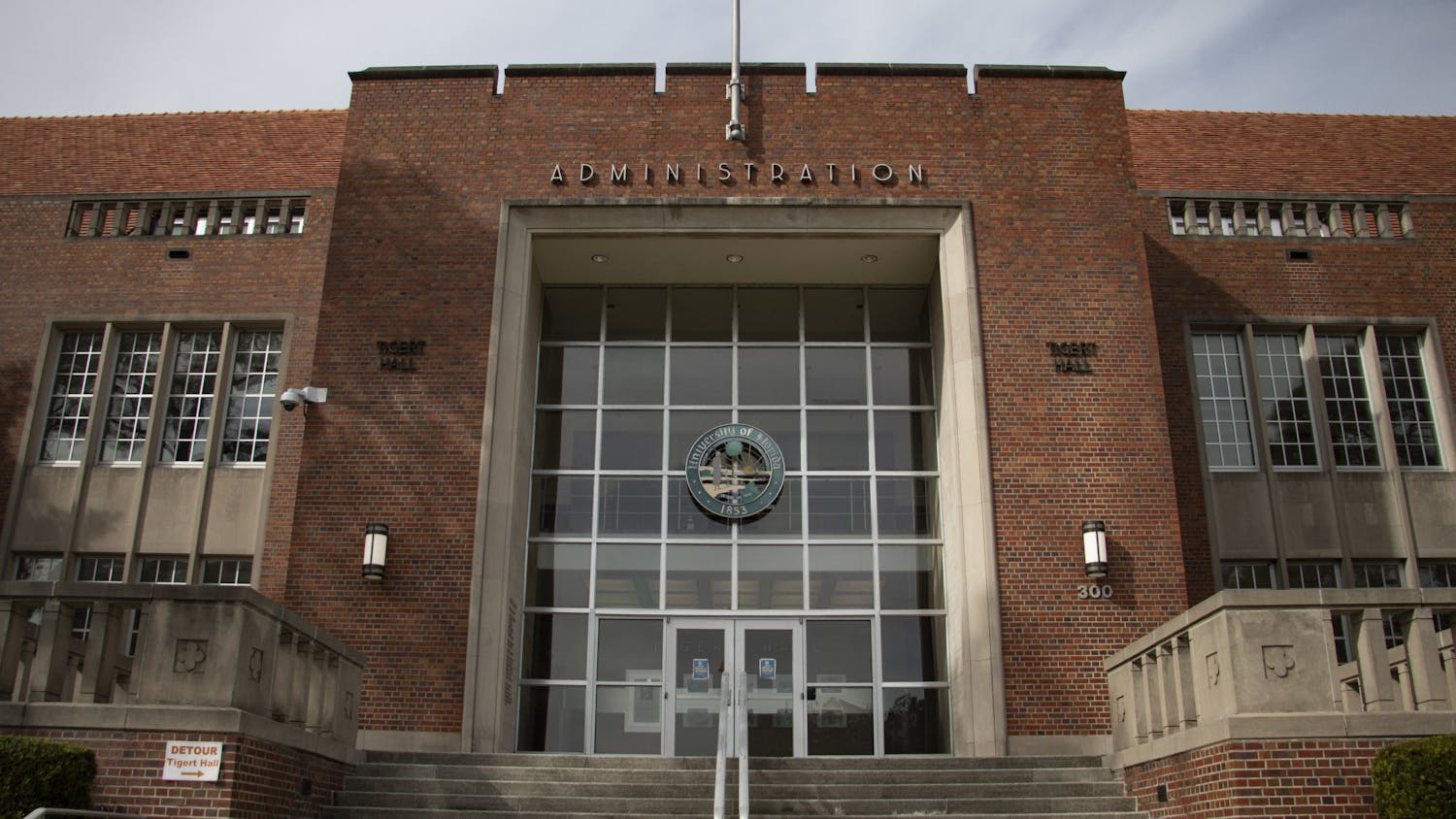In the days following the statewide ban on diversity, equity and inclusion funding, students at the University of North Florida are protesting the closure of their school’s LGBTQ+ center. Meanwhile, UF faculty and students are still unsure what the future looks like.
The Florida Board of Governors gave final approval Jan. 24 to a ban on universities putting state or federal funds toward DEI or “social activism” programs.
Gov. Ron DeSantis first passed the DEI funding ban in May 2023. In November, the Florida Board of Governors agreed to adopt a loose interpretation of the terms “DEI” and “social activism” through Regulation 9.016. Now, the regulation is approved and in effect.
The new regulation interprets DEI as advantages based on race, gender or sexual orientation, or the idea a group’s action is biased because of those factors. “Social activism” is defined as a goal to change a government policy or achieve a social issue.
UNF announced hours after the regulation’s approval that it will close its Office of Diversity and Inclusion, including its women’s and LGBTQ+ centers. The UF administration hasn’t issued a similar plan of action as of Jan. 28.
In January 2023, a state-ordered audit showed UF dedicated over $5 million — or about 0.14% of its operating budget — to “programs and initiatives related to diversity, equity and inclusion, and critical race theory” for the 2022-2023 fiscal year. Over $3 million came from the state.
The largest portion of funding was divided among DEI deans, directors and committees in UF colleges. Other high-funded categories included the Chief Diversity Office, Center for Inclusion and Multicultural Diversity and various humanities-based courses.
UF college DEI administrations
Nine UF colleges had deans responsible for DEI in January 2023. One year later, eight of those deans are still at UF — but none hold the same position.
Two of the former DEI deans have become simply “associate deans” in the past year. But six hold similar roles with differently worded titles. For example, the former associate dean for diversity, inclusion and global affairs in the nursing college is now associate dean for community engagement and global affairs.
Robert Thomas, former associate dean for DEI at UF Warrington College of Business and current assistant dean for DEI at Indiana University, overheard conversations about changing titles in response to DEI pushback before leaving UF in 2022.
The changed job names came in response to anti-DEI legislation. But most newly labeled faculty are simply continuing the same work under different titles, Thomas said.
“No one wants to break the law, so if DEI is not allowed, then definitely nobody's going to work under that title,” he said. “But the activities that are performed, the inclusiveness, the attempt to increase success rates for all students — that work needs to happen regardless of what title you associate with it.”
As Florida cracks down on DEI, universities in other states are recognizing the opportunity to acquire UF faculty fed up with the state’s political climate, Thomas said.
“I was getting two to three requests for interviews a month from various groups, looking for somebody to work in the area of DEI,” he said. “People who are marketable are being targeted right and left and being asked if they're willing to move, and a lot of people who previously were unmovable are open to those offers.”
The UF College of Journalism and Communications didn’t identify a DEI dean in January 2023, but it did have a committee of inclusion, diversity and equity, which voted in November to change its name to the “Community + Culture” committee.
College faculty approved the name change Jan. 26 — two days after Regulation 9.016 passed — said committee co-chair and UF journalism professor Matt Sheehan.
Shifting to community and culture is “no big deal,” Sheehan said. The committee never practiced DEI in terms of basing preferences on demographics. Instead, the rechristening was just to ensure the college is up-to-date with state law, he said. He thinks the committee, under its new name, will hold up under the new regulation, he said.
Sheehan has heard no instructions from UF administration about the DEI defunding in the days since the regulation passed, he said.
College administrations received almost $2.5 million in the 2022-2023 operating budget across all colleges for dean, director, committee and organizer positions, 51% of which was state-funded. The College of Veterinary Medicine received the most funding at over $200,000.
UF Chief Diversity Office
UF hired Marsha McGriff as Chief Diversity Officer in 2021. Her role was created based on results from a 2015 faculty survey asking how administration could improve the UF workplace environment.
McGriff, a member of the president’s cabinet, was salaried at $300,000 in Fall 2022. Of her office’s over $1 million from the 2022-2023 operating budget, about $780,000, or 72%, came from state funding.
McGriff and her office did not respond to requests for comment on how the regulation may change their operations moving forward.
Graduate school programs
UF graduate school DEI programs, as identified by the 2022 report, include the Office of Graduate Diversity Initiatives and SF2UF, a Santa Fe College to UF bridge program that seeks to increase the number of minority SF transfer students.
The OGDI website no longer exists, and the last event the office advertised on its social media took place in May. The office previously worked to recruit and retain underrepresented graduate students.
Graduate diversity programs received about $331,000 from the 2022-2023 operating budget — 97% came from state funding.
Center for Inclusion & Multicultural Engagement
The Center for Inclusion and Multicultural Engagement oversees offices for Asian, Black, Hispanic and LGBTQ+ student engagement. The center runs first-year student transition programs, diversity training workshops, a yearly diversity symposium and a multicultural mentor program.
But students can also head to the second floor of the Reitz Student Union just to do homework or hang out with members of their own community.
“I just feel at home being surrounded by other Asians and minorities on campus,” said Mackenzie Prostek, a 19-year-old UF biology freshman who frequents the Asian American Pacific Islander Desi office to meet with the Chinese Student Association or to just chat with friends.
As a Chinese adoptee, Prostek grew up not knowing much about her culture. Having a resource on campus that helps her connect to her heritage and meet other Chinese students makes her feel a little bit closer to home, she said.
Alexandra Cies, a 20-year-old UF kinesiology sophomore, doesn’t go to the LGBTQ+ center when she needs to get homework done because she knows she’ll get caught up in conversations with other students. She knows she won’t have to deal with homophobia there, and worries what will happen if she loses her primary safe space, she said.
“I’m kind of nervous about the whole center getting shut down, honestly,” Cies said. “Nobody would want to come here … they would go to other schools.”
The CIME received over $400,000 in the 2022-2023 operating budget, 85% of which was state-funded. The center declined to comment on how the funding ban may change its operations moving forward.
DEI-related courses
Social Geography, Theatre Appreciation, Cultural Anthropology and Introduction to Health Disparities were all UF courses identified as promoting DEI or critical race theory in the 2022 report.
Nine of the 10 courses identified are still offered, with the exception of Language in the USA. The regulation contains an exception for DEI defunding when it comes to “classroom instruction,” but Florida already banned teaching discrimination based on race, color, sex or national origin in March.
The problem with regulating DEI and critical theory in classrooms arises in the vagueness of those definitions, said UF law professor Chris Hampson.
“These laws, when I read them as an attorney, I see a lot of vagueness, I see a lot of ambiguity,” he said. “I'm not sure what it means to say or teach that systemic racism is ‘inherent.’”
The law will almost certainly be challenged based on vagueness and First Amendment violations, Hampson said. The ban was already sued by New College faculty and students in August. Though a federal judge ruled that challenge premature, Hampson expects to see pieces of it challenged now the regulations are finalized in court, he said.
Though he senses faculty are feeling unsettled about what the law will mean in Gainesville, he hopes they will receive guidance from administration soon.
“What I've been told is for now, business as usual, until we're told how UF will be implementing the law,” he said.
The 10 DEI-related courses received over $550,000 of the 2022-2023 operating budget, all from state funds. Theatre Appreciation was the highest-costing at $134,502 and more full-time employees than any other class.
UF will comply fully with state legislation and state regulations, said UF Spokesperson Steve Orlando in a statement to The Alligator.
“Gators believe in universal dignity and the immeasurable worth of every individual,” the statement read. “We will continue to foster a community that is built on trust and respect and is committed to academic excellence.”
None of the faculty members who spoke with The Alligator had received instruction about how the regulation will be implemented at UF as of Jan. 28. The university administration has made no public statement on the issue.
Contact Zoey Thomas at zthomas@alligator.org. Follow her on X @zoeythomas39.
Zoey Thomas is a media production junior and The Alligator's Spring 2025 data editor. She previously reported for the metro, university and enterprise desks. In her free time, you can find her reading, crocheting or arguing for the superiority of sweet potatoes over regular potatoes.






